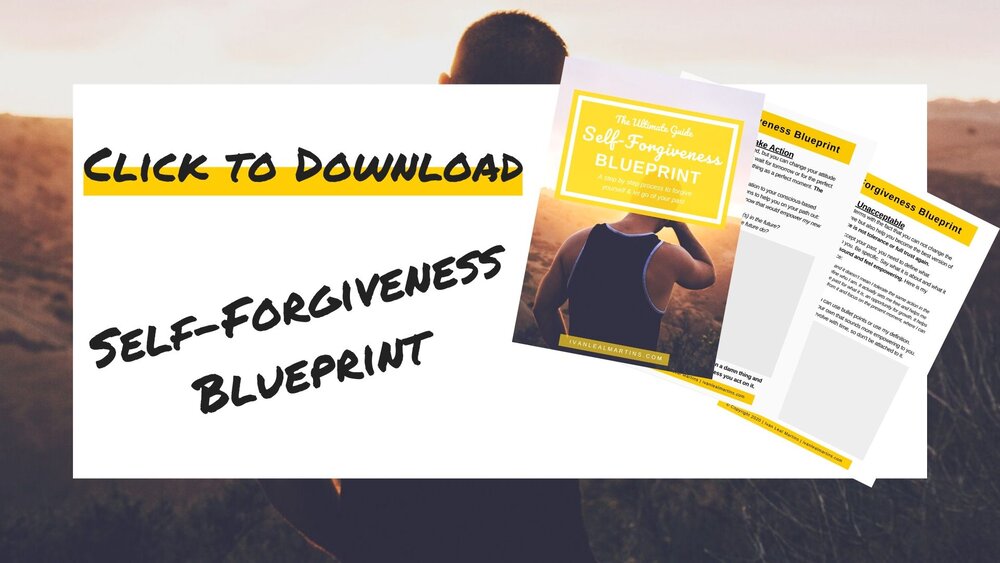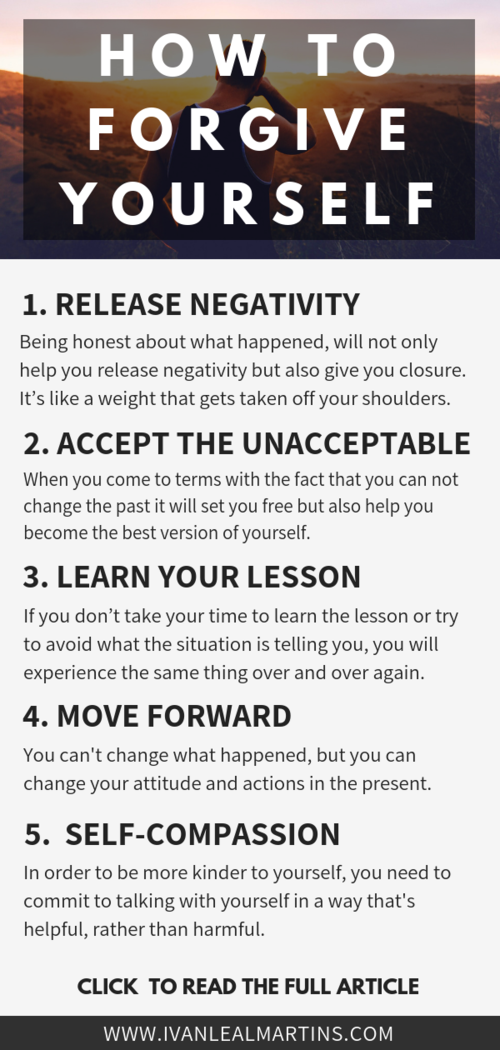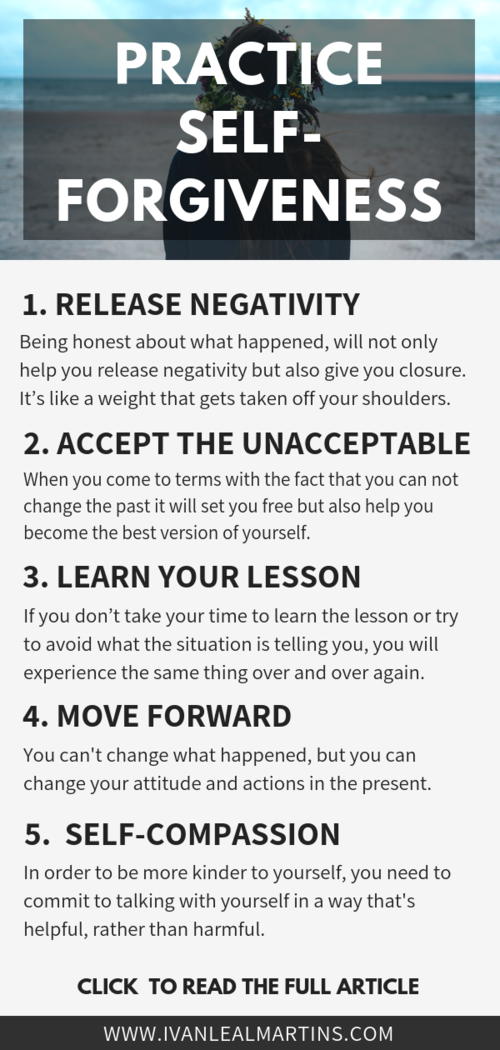We hear a lot about how crucial it is to forgive those who have harmed us, but what about forgiving ourselves?
Self-forgiveness is absolutely vital if we wish to have a healthier and peaceful relationship with ourselves.
It is not enough just to say you forgive yourself.
It takes a lot of self-compassion and kindness towards yourself in order to transcend your anger at yourself with love.
Moreover, viewing yourself with empathy helps you to forgive yourself easier.
You’re probably thinking.
This all sounds lovely and amazing in theory Ivan; however, in practice it’s a totally different story.
Okay, you probably didn't have this thought, but what I actually want to say and lead into is that genuine self-forgiveness is a process and takes time.
The only thing you need to do is to take daily small actions towards self-forgiveness.
Ultimately you want to create a habit that reinforces self-forgiveness on a day-to-day basis.
Your focus should be on becoming a self-forgiving person, rather than getting a particular outcome.
Are you ready to learn to forgive yourself and let go of your past, so you finally can focus on moving forward, creating and going after the life you want?
Yes, I am!
Okay, that was my answer.
What’s yours?
1. Face Your Fears & Release Negativity
It’s crucial that you first learn to release some tension and negativity and confront yourself with the facts what actually happened.
Most people think that not talking about it ever again is the way to go.
I know that you are thinking about it even when it’s too painful to talk about it.
Probably you are going over it right now in your head.
Even when you don’t think about it, your subconscious will.
You can not run away forever.
Face it now before the negativity put you down.
I know it’s painful to address it.
It feels like you’re reopening a wound and you’re feeling all the pain again.
However, like every major wound you need to take care of it, in order to heal the wound.
Let’s take care of it now!
Exercise:
Before we move to the exercise I want to share with you 2 approaches that helped me face my fears and release negativity.
One will be for extroverts and the other one for introverts.
Don’t forget what works for me, doesn’t mean it has to work for you.
The key here is to identify what works the best for you.
The extrovert approach is an obvious one, but like I mentioned before a lot of folks have a big issue to share their past with someone else.
By sharing what happened you will not only get more clarity but also learn to deal with it.
If you are like me, every time you are totally honest about what happened, it will not only help you to release negativity but also give you some closure.
It’s like a weight gets taken off your shoulders.
I am not going to lie, the pain is still going to be there, but it doesn’t affect you like it used to do.
You don’t need to go through it alone.
It can be a friend, a family member, a therapist or a coach, no matter who it is, make sure they don’t judge you and most importantly they stay objective.
However, if you are not an extrovert and you don’t like to talk with friends and family about your personal stuff, I would recommend you to get a journal.
Journaling helps me talk about things that I am not ready to share with anybody else yet.
It helps me get those thoughts and emotions out of my head and into a piece of paper.
The biggest benefit of journaling is that you can be totally honest about how you feel and what your thoughts are since there will be no one, who will read it and therefore, no-one who will judge you.
You are free to express yourself.
You’re probably thinking, where is the exercise, Ivan? What is the action you want me to do?
Well, I am glad you ask!
The action I want you to take is to share and express yourself fully about one thing of your past, which you have trouble to forgive yourself with.
You can talk with someone or write about it.
How you do it, is up to you.
If you are facing some resistance I recommend to write it down on a piece of paper.
The only thing that matters here is that you finally take the step to express how you really feel and that you are completely honest with yourself.
Let’s do this!
2. Accept the Unacceptable
Most people try to change what can’t be changed.
I get it, sometimes when something unexpectable happens and when a lot of pain was caused we try to “fix it”.
Although you know that there’s no way to change what happened, we create these false realities in our head, where things were different, where everything had a different ending.
I call them the “What ifs”.
What if I did this. What if I never went there or said that. What if…
To be honest, I used to be that kind of person, who would focus on every single different future.
I always felt like if I would accept the past, that meant that I wouldn’t care about what happened and that I am a bad person.
Now, I know accepting the unacceptable has nothing to do with being a bad or good person.
No matter who caused the pain or who you caused it too, it’s not helping you out to think about alternative realities, where things could have been different.
By constantly trying to change your past and come up with all different realities you will get stuck in the past, which will make it impossible to move forward to a better future.
Your past actions don’t define who you are.
I firmly believe that with the new perspective you have now, you probably would change and do a few things differently if the same situation would happen.
However, back then you didn’t have the skills and knowledge you have now, or else you would have done things differently, right?
There is nothing you can do now that will change the past.
The past is written down.
You only have one option left.
You need to accept what happened.
Did it trigger you?
I don’t know about you, but if someone would tell my past self to accept my past and move on, I would punch them in the face.
That’s how attached I was to my past.
I let my past define who I was, which was more harmful than helpful.
Moreover, a lot of people still confuse or think to know what acceptance means.
They think by accepting what happened they automatically have to forgive every single action and tolerate it too, even when something similar happens.
A big shift in my life was realizing what acceptance is and isn’t.
Acceptance is not tolerance!
You don't have to tolerate it ever again.
if you think by accepting the unacceptable you have to tolerate everything & that history will repeat itself again NO WONDER you have a hard time to accept the past.
When I tell you to accept the past, I am telling you to let go of trying to change the past and stop coming up with 100 different scenarios where things didn’t end as they did.
You did your best with the resources and knowledge you had.
Moreover, some situations are out of your control. Like actions and responses of other people.
You are not responsible for others actions, only for yours.
Therefore, you are not a bad person when you accept the past.
Let me repeat it again.
You are NOT a bad person if you accept the past.
When you accept the unacceptable and you come to terms with the fact that you can not change the past, cause the past is done, you open yourself up to more acceptance in your life.
Acceptance will not only set you free but also help you become the best version of yourself.
You will start to realize that the real power doesn’t lie in the past, either in the future, but in the present moment.
Exercise:
In order to learn to accept your past, you need to define what acceptance means to you.
Be specific. Say what it is about and what it isn’t for you.
Make it sound and feel empowering.
To help you out, here is my definition of acceptance.
Acceptance is a process and it doesn’t mean I tolerate the same action in the present, neither does it define who I am. It actually sets me free and helps me surrender and embrace the past for what it is, an opportunity for growth. It helps me learn to detach myself from it and focus on the present moment, where I can make a difference.
I actually don’t say those sentences to myself every single time
Just for the sake of showing you and inspiring you, I wrote them in sentences.
Here are the keywords for my definition when I think of acceptance.
Process
Freedom
Opportunity for growth
Focus in the now
Isn’t tolerance, neither full trust.
The key here is to make sure your definition resonates with you and feels empowering, positive to you and not fear-based.
Feel free to copy my definition if you have a hard time coming up with one for now.
Plus, don’t be attached to your definition.
Your definition of acceptance will evolve and grow as you will too.
Now that you defined what it means to you, it’s not going to be enough to just have it written down.
You need to remind yourself about it daily.
Read it out loud every single day, before you go to bed.
Use your phone or apps to remind you.
Create a game out of it.
Be creative.
It’s crucial that you keep reminding yourself of what acceptance means to you.
You want to reprogram the limiting beliefs you picked up during your life towards a more helpful belief (your definition).
Here are the exercise steps in bullet points.
Write down on a paper what acceptance means to you
Make your definition sound empowering and positive
Review your definition daily, be creative.
3. Lessons & Messages
In every experience in life, there is a lesson to be learned.
If you don’t take your time to learn the lesson or try to avoid what the situation is telling you, you will experience the same thing over and over again.
Life has its funny way to present you with similar obstacles until you learn the right message for you.
By learning the “right” message for you, you discover what needs to be changed in order to prevent the same situation to happen so history doesn't repeat itself again.
There is a secret ingredient most people forget to apply when they want to forgive themselves.
The secret ingredient is to be objective. (and to eat a lot of chocolate, kidding)
By detaching yourself from what happened and taking the focus out of you, you will gain some clarity and perspective.
Viewing what happened from other perspectives without looking at it as the victim you will open new doors and opportunities for you to learn your lesson(s).
EXERCISE:
To get an understanding of what happened and learn from the situation I have some questions for you, which might help you find out what the lesson(s) from your experience could be.
Ask yourself:
What would I have done differently if I could go back and do it again?
What can I learn from this situation?
How can I grow from this experience?
What are the lessons I need to learn to prevent this from happening again?
Write them down.
A PERSONAL TIP:
The intention of the message matters too.
I am specifically talking about a fear-based or a conscious-based lesson.
Fear-based messages are negative, draining intentions, which only protect you in short-terms from the same situation to happen again.
However, after a long period of time, it’s going to pull you down and hurt you more since the driver of the intention is fear-based. In most scenarios, you will experience the same situation again.
Conscious-based lessons are positive, build you up and bring the best out of you.
In the long-term, you not only make sure that the situation never happens again, but you also grow from it since the intentional of that message is empowering.
In the end, make sure the intentions of your lessons are empowering and helpful rather negative and harmful.
4. Move Forward & Take Action
This is my favorite step since is all about taking the right action to empower your new behaviors, create a new mindset and beliefs to make sure the same situation doesn’t happen again.
You can't change what happened, but you can change your attitude and actions in the present.
Don’t wait for tomorrow or for the perfect moment to act.
There is no such thing as a perfect moment.
Moreover, if you are looking for the perfect moment than guess when this moment will be.
Now.
Exercise:
Come up with an action plan in relation to your conscious-based massage(s).
Here are some questions that might help you out.
What is a baby step I could do now that would empower my new message?
How can I honor my new lesson(s) in the future?
What would my ideal self from the future do?
If you still haven’t done the work what are you waiting for?
You gotta do the work first if you want to live a life full of freedom and self-compassion.
So grab a paper and a pen or your smartphone and go through the whole process now.
Everything you learned now will not mean a damn thing and make a single difference in your life situation unless you act on it.
You have to literally make the difference.
5. Bonus: Self-Compassion
Honestly, I am still working on self-compassion since I am known for being hard on myself.
I used to think to myself that no matter what I achieve it was not good enough.
I could do better.
It used to motivate me, but now it’s making me miserable.
Not treating myself with kindness and compassion wasn’t being helpful.
I was actually being the obstacle and making it harder to myself to practice self-forgiveness.
This had to stop now.
I decided to have a more empowering positive self-talk with myself.
During the past year, I’ve been practicing self-compassion.
Moreover, my first step was to talk to myself in a way that is helpful, rather than harmful.
Did it always work? No!
Did it make a difference after a few days? Yes!
What I realized is that changing my inner dialogue takes time.
I had to go through patterns, believes and why this negative self-talk was created first.
After shifting those believes, patterns and negative messages from the core it changed my life.
I became a more joyful person.
Now, I know how to practice positive self-talk to live a life with more self-compassion and kindness towards myself.
Exercise:
Be aware of when you start talking in a way that’s harmful rather than helpful
Tell yourself “I am good enough” or “I love myself“
Make it a ritual
If you feel guilty you feel poorly about something you did or neglected to do, you need to learn that it’s okay to make “mistakes”.
If you feel shame you feel poorly about who you are, you need to learn that it’s okay to be who you are.
You are probably feeling that you are not good enough or that you don’t love yourself anymore.
A quick tip from me to you.
Tell yourself on a day-to-day basis that you are good enough and that you love yourself for who you are.
Write in all mirrors in your home that you are good enough. Use little “I am good enough” notes all over your house and in your pocket to remind you that you are good enough.
I changed the desktop screen picture on my laptop into an image, where it’s written in big letters “I AM GOOD ENOUGH”
It helped me accept myself and stop feeling shame for who I am little by little.
I am feeling better and happier than ever.
In order to be kinder to ourselves we need to commit to taking one step at a time.
If I can do it then you can do it too!
Start with this blog post: How to practice positive self-talk
Now let’s talk about you
What are your thoughts about this blog post?
Do you struggle with forgiving yourself?
What are your key takeaways from this post?











